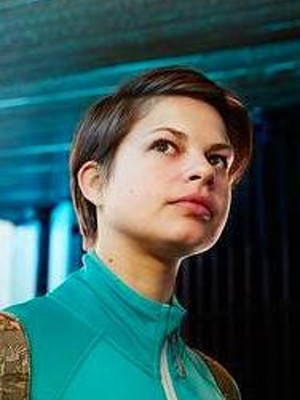Brexit Data Challenge part 2: presentation at GISRUK
Posted on 21 June 2018
Brexit Data Challenge part 2: presentation at GISRUK
 By Reka Solymosi, University of Manchester
By Reka Solymosi, University of Manchester
After our Brexit Data Challenge Hackathon our paper got shortlisted to be presented at the 2018 GISRUK conference. While I was unable to attend, two members of the hackathon team, Heather Robinson and Sam Langton went to represent our group. This is a guest blog of sorts by them on their experience on presenting our paper and the event in general.
Heather Robinson
Last week I was lucky enough to attend the 2018 GISRUK conference at The University of Leicester. I was representing R Users at University of Manchester (RUM), an informal R user group which I co-organise. We had decided to enter the GISRUK 2018 data competition, analysing the link between ethnic composition change and UK referendum voting as subject matter for our first hackathon, which we organised with our partners, the Manchester Metropolitan University R User group. Our entry focused on promoting the use of open source data, this time from ONS, which we used to explore other demographic variables significantly associated with Brexit voting. It was a great event made possible by the Software Sustainability Institute and The R Consortium and attended and contributed to by 12 academics from all disciplines. You can read more about the hackathon event in a previous blog post here. Little did we know that our entry would be shortlisted and invited to present our findings at GISRUK 2018, once again enabled by funding from the Software Sustainability Institute.
As a biostatistician and health data analyst, I had some reservations about attending a conference organised largely by geographers. Would I be able to follow the sessions? I was surprised to learn that some of my past work that involved spatially mapping my research findings had in fact been GIS related, so perhaps I was a GIS researcher after all! The passion of keynote speaker May Yuan for GIS research was infectious, as was the shared belief of all of the speakers that no analysis is complete without spatial modelling, and by the time the conference had finished, I felt committed to integrating spatial aspects into my future work.
 Typically, in health, we couple patient data to metrics about environment based on a static home address. The health session highlighted the fact that individuals are influenced by characteristics of their full daily route, the environment passed through and the potential for interaction with multiple places. May Yuan raised the issue of personalised reality emerging through personalised geography – the idea that we increasingly construct our own perceived reality, as influenced by social media and personalised apps, yet more positively, praised the recent transition to a ‘human eye view’ of geography through the emergence of technologies including Google Street View.
Typically, in health, we couple patient data to metrics about environment based on a static home address. The health session highlighted the fact that individuals are influenced by characteristics of their full daily route, the environment passed through and the potential for interaction with multiple places. May Yuan raised the issue of personalised reality emerging through personalised geography – the idea that we increasingly construct our own perceived reality, as influenced by social media and personalised apps, yet more positively, praised the recent transition to a ‘human eye view’ of geography through the emergence of technologies including Google Street View.
After attending a GODAN thinktank to discuss how GIS based technologies can support sustainable food –production in the developing world, it is clear that apps are the future of interaction between geography and individuals, allowing real time data and tools to be harnessed for personal benefit via smart phones. Eventually, even the most unlikely of us appear destined to become geographers.
Unfortunately we did not win the GISRUK data competition, but we had the fascinating opportunity to see how four groups could complete very different analyses of the same data, although ultimately reaching similar conclusions (if you are interested in our results, our submission and code are shared at Brexit Data Challenge). We left with a passion for geography and a greater appreciation of what can be achieved in such a rich global data landscape.
Sam Langton
One of the many great things about being a PhD student in Manchester is the diverse research community that exists as a result of having multiple academic institutions in one city. I had been involved with the R user group at Manchester Metropolitan University (MMU) for only a couple of weeks before I found out about the equivalent group over at the University of Manchester. The enthusiasm of both groups to collaborate and share ideas was motivating and genuinely inspiring, particularly given the customarily competitive atmosphere between universities in the UK.
The Brexit Data Challenge
The announcement of the Consumer Data Research Centre (CDRC) Brexit Data Challenge was therefore a fantastic opportunity to demonstrate the power of collaboration through a joint hackathon, funded by the Software Sustainability Institute (SSI) and the R Consortium. The challenge focused around an article by The Economist, which examined the regional relationship between immigration and voting behaviour in the EU referendum. Participants were encouraged to scrutinise the claims made by The Economist with innovative visualisations and analysis. It was an ideal opportunity to bring the two R user groups together for an afternoon and put together a submission. The dozen or so attendees came from a wide range of academic disciplines, from sociology to medicine, and from the entire spectrum of experience in R, from expert to absolute beginner! Our inclusive approach made it even more special to be shortlisted, giving me the opportunity to present at the GISRUK conference at the University of Leicester with Heather Robinson from the University of Manchester. Although we didn’t win the final prize, the experience was testament to the open and community-driven mentality of R users, that we pulled together such a submission with a diverse group of researchers, all whilst involving new users and having a lot of fun!
GISRUK 2018

The GISRUK conference hosts a phenomenal array of research topics. It would be an impossible task to summarise all the panels that I attended over the three days in Leicester, but I would strongly recommend that you visit the GISRUK website conference schedule for the papers corresponding to each presentation. Instead, I will focus on the talk that I thought generated the most interesting discussion: the closing keynote of Alex Singleton from the University of Liverpool.
The topic of the keynote was open data. The talk began with success stories of using open data from Alex’s career, which include a major contribution to the 2011 area classification for Output Areas, amongst a host of other achievements. But the talk was not simply a celebration of open data. It was also a critique about existing limitations and upcoming challenges.
Firstly, open data is largely only usable for a minority of technical individuals. For many people, the task of downloading, cleaning, transforming and analysing ‘dirty’ raw data is either impossible or fraught with difficulty. This represents a significant barrier to the public in exploiting the benefits of open information. Secondly, open data that is available today may not be available tomorrow. This was what Alex referred to as the ‘illusion of permanence’. Entire research projects may rely on the preservation of open licences, with little guarantee of continuity. Thirdly, open data is not always appropriate to meet the demands of the research. Despite growing calls for data at individual or micro-level spatial scales, open data will always be restricted by concerns over confidentiality. Open crime data in the UK, for instance, is only accurate to a certain degree of temporal and spatial aggregation. For the real deal, you need police vetting and a secure computer environment facility, which comes at no small cost.
The future is bright
Nevertheless, there are many reasons to be positive! It is clear that institutions like the CDRC are pushing to make open data future-proof and more accessible to non-experts. Moreover, researchers with the expertise and facilities to handle complex and/or secure data can create typologies that enable open and easy access. Alex gave a recent example of this with the London Workplace Zone Classification. The audience was also reminded how integral open software is to the development of open information, given the requirement for transparent and reproducible research. On this topic, Alex gave specific praise to R, the whole reason I was at the conference in the first place! The keynote topped off a fantastic conference, and one that I am sure will encourage the R user groups at MMU and the University of Manchester to organise more collaborative events, and get even more new users involved in upcoming R projects through the SSI.
Photographs below: Alex Singleton’s keynote, and a photograph from the conference dinner, which was held at the National Space Centre.

